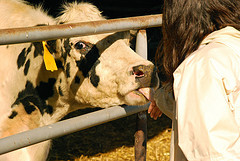Court Orders FDA To Investigate Use Of Antibiotics In Animal Feed

(afagen)
Back in 1977, the FDA proposed a ban on putting penicillin and other antibiotics in animal feed solely for the purpose of promoting growth. Amazingly, that proposal has been gathering dust long enough to begin losing its hair and regretting its life choices. That is until yesterday, when a federal court ordered the FDA to finish what it started 35 years ago.
Yesterday’s decision by a Manhattan-based federal district court comes as the result of a lawsuit filed by the Natural Resources Defense Council, Center for Science in the Public Interest, Food Animal Concerns Trust, Public Citizen and Union of Concerned Scientists. The plaintiffs were seeking to compel the FDA to follow through on the proposal, in spite of the fact it never held a single hearing following the initial 1977 decision.
The plaintiffs and other consumer advocates have long argued that the use of antibiotics for growth promotion has helped to create antibiotic-resistant pathogens. In his ruling, the judge in the case agreed, writing that “The scientific evidence of the risks to human health from the widespread use of antibiotics in livestock has grown, and there is no evidence that the FDA has changed its position that such uses are not shown to be safe.”
The next step is for the FDA to hold a hearing to allow the makers of these antibiotics to make the case that their products are not having an adverse effect.
“If, at the hearing, the drug sponsors fail to show that the use of the drugs is safe, the [FDA] Commissioner must issue a withdrawal order,” wrote the judge.
In 2010, the FDA kindly asked farmers to follow voluntary guidelines about using antibiotics on farm animals.
At the time, the National Pork Council scoffed at the news, saying “Show us that use of antibiotics in animal production is causing this antibiotic resistance… How do we know [the problem] is not on the human side?”
Earlier this year, it finally got around to banning the use of the widely used cephalosporin class of antibiotics for purposes that don’t involve actually curing animals of infections, though that ban did not include the penicillin or tetracyline drugs mentioned in the original 1977 proposal.
“This health threat has been hiding in the margins for four decades. The rise of superbugs that we see now was predicted by FDA in the ’70s,” said NRDC attorney Jen Sorenson in a statement to Consumerist. “Thanks to the court’s order, drug manufacturers will finally have to do what FDA should have made them do 35 years ago: prove that their drugs are safe for human health, or take them off the market.”
Want more consumer news? Visit our parent organization, Consumer Reports, for the latest on scams, recalls, and other consumer issues.

